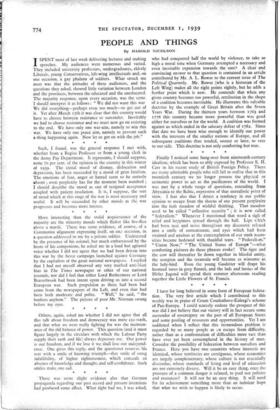Finally I noticed some hang-over from nineteenth-century idealism, which has
been so ably exposed by Professor E. H. Carr in his recent study of British Foreign Policy. There are many admirable people who still fail to realise that in this twentieth century we no longer possess the physical or economic power to act as the pacificators of the world. I was met by a whole range of questions, extending from Abyssinia to the Baltic, expressive of that unrealistic point of view. I fear also that I detect a tendency in our public opinion to escape from the thorns of our present perplexity into the lush meadow of wishful thinking. That meadow used to be called " collective security " ; it is now called " federalism." Whenever I mentioned that word a sigh of relief and happiness spread through the hall. Lips which had been taut and tense throughout my discourse relaxed into a smile of contentment, and eyes which had been strained and anxious at the contemplation of our stark neces- sities became bedewed with thankful tears. " Federalism," " Union Now," " The United States of Europe "—what comforting pictures do these phrases evoke! The tiger and the cow will thereafter lie down together in blissful amity, the scorpion and the tarantula will become as winsome as the lady-bird. Even the young Gauleiter will drape his bronzed torso in grey flannel, and the lads and lassies of the Hitler Jugend will spend their summer afternoons reading together the Little Flowers of St. Francis.












































 Previous page
Previous page